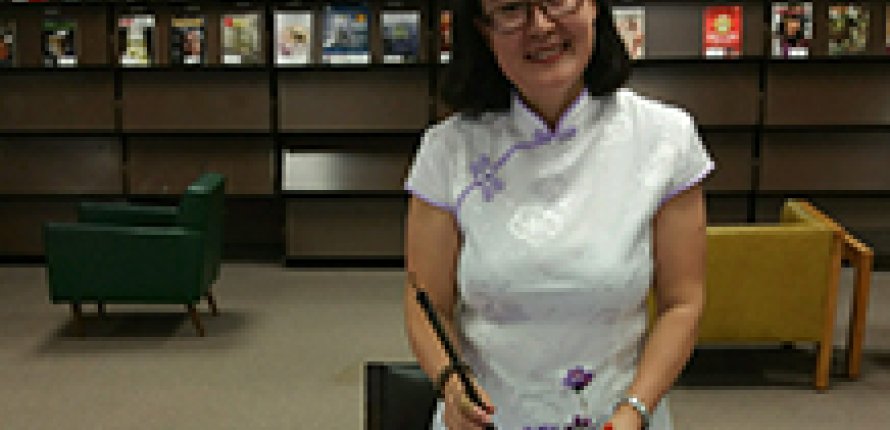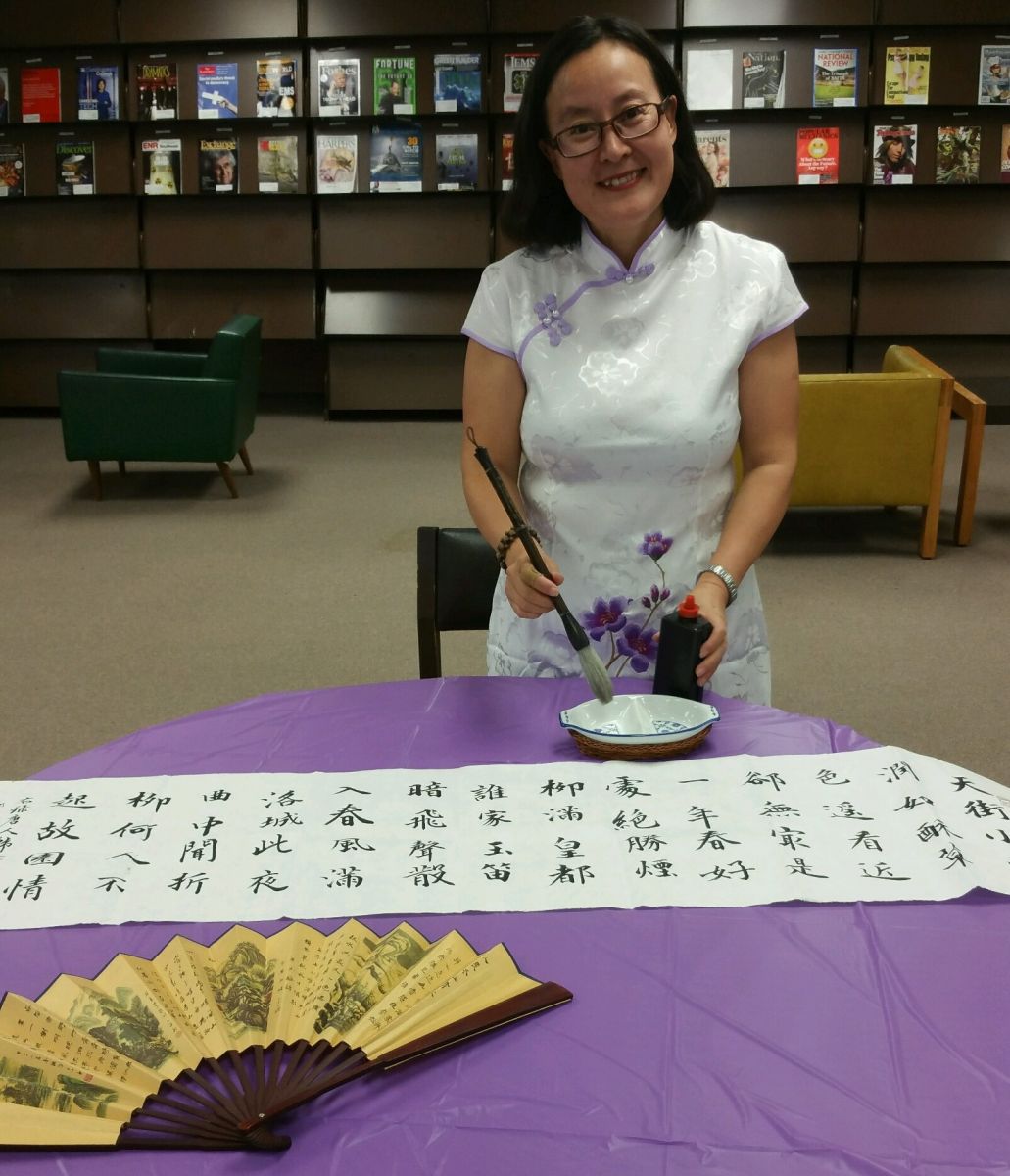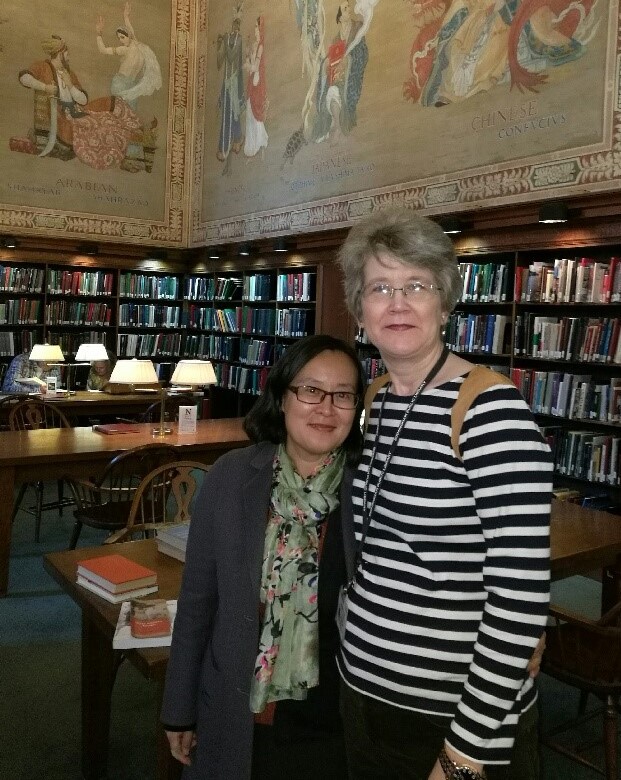The Expression of Inexpressible: My Wonderful Experience in the U.S.

Farong Zhu (朱法荣), Professor of American Literature at Shandong Agricultural University, China
2017-2018 Fulbright Visiting Scholar to the City College of New York
 By August 2, 2018, I will have to say goodbye to the Big Apple and the lavender-colored City College of New York. As a 2017-2018 Fulbright Visiting Scholar, I feel highly honored and thankful to all the people who are connected with the program and those who have helped me during my stay in the United States. The Fulbright Visiting Scholar Program is not only a great experience but also a high honor for all grantees, especially for me, an English teacher as well as an American literature researcher.
By August 2, 2018, I will have to say goodbye to the Big Apple and the lavender-colored City College of New York. As a 2017-2018 Fulbright Visiting Scholar, I feel highly honored and thankful to all the people who are connected with the program and those who have helped me during my stay in the United States. The Fulbright Visiting Scholar Program is not only a great experience but also a high honor for all grantees, especially for me, an English teacher as well as an American literature researcher.
Before receiving a Fulbright award, I had taught English as a Foreign Language for 23 years and American Literature for 13 years in China, and published several key journal articles in Chinese on Ernest Hemingway and F. Scott Fitzgerald. To visit the United States and research with scholars here was my long-cherished wish, as Hemingway and Fitzgerald have a very large readership in China. Both Hemingway and Faulkner were first introduced to China in the early 1930s, while the first article that mentioned Fitzgerald as an equal to Hemingway was published in 1980, fifty years later. My research happened to follow the same law, though unconsciously, transferring from Hemingway’s code hero, the traits found in Hemingway’s main characters, to Fitzgerald’s American dreamer. In the end, beyond my expectation, I was haunted by the life and writings of Zelda Fitzgerald, F. Scott Fitzgerald’s wife.
My interest in Zelda Fitzgerald was sparked in 2006, when I was diagnosed with a kind of thyroid cancer and had to pause my research. Like Alice, unexpectedly, I fell into a deep and weird rabbit hole. During those hospitalized days and the following recovery years, I turned my eyes to those people suffering like me. Ernest Hemingway’s memoir The Moveable Feast led me to the Fitzgeralds, and then Jackson Bryer’s Dear Scott, Dearest Zelda led me further to Zelda, whose destiny seemed an Aeschylusian drama played on the modern stage. I wish more Chinese readers could be acquainted not only with her life as a flapper of the 1920s but with her own writings.
Ten years later, I finally translated Zelda’s autobiographical novel Save Me the Waltz into Chinese(《给我留下华尔兹》)and published it in 2016 by the People's Literature Publishing House, the most prominent press in Beijing. The book was beautifully and exquisitely designed with 18 paintings and the paper dolls by Zelda, and it immediately won the Best 50 Books of 2016 in China. The first 5,000 copies of the book quickly sold out, and at the same time, my article on Zelda's writing style was published in the journal English and American Literature Forum, edited by Shanghai Foreign Studies University.
Thousands of Chinese readers showed their interests in Zelda, and the more I read Zelda, the more similarities I found between her and the Chinese-American writer Eileen Chang (张爱玲,1920-1995), who was born in an upper-class family in Shanghai, studied English in Hong Kong University but did not graduate because of the Japanese occupation, and began her writing career in the Japanese-occupied Shanghai. With a series of romances and witty essays, she quickly became a cultural icon of the era in China, at her age of 23. Her articles and short stories were so witty and pretty that they earned her a nickname “Nine-tailed Fox.” Chang’s best-loved novels were Love in a Fallen City (《倾城之恋》) and The Golden Cangue(《金锁记》), and her often-quoted line was “Life is a resplendent robe covered with bugs.” Later, Chang immigrated to the United States in 1955 and married American screenwriter Ferdinand Reyher in 1956. She became a U.S. citizen in 1960. The poet and University of Southern California professor Dominic Cheung highly praised Chang as a candidate for a Nobel Prize. Now, Eileen Chang is universally considered as great as Lu Xun (鲁迅1881-1936), a well-respected modern Chinese author.
So, when my home university, Shandong Agricultural University (山东农业大学), posted the announcement about the 2017-2018 Fulbright Visiting Scholar Program, I eagerly applied. On August 23, 2017, I arrived in New York City and the next day I went to my host university, City College of New York, where Professor Elizabeth Mazola, Chair of the English Department of the Humanities and Arts Center warmly welcomed me, showed me around the campus, then led me to an office provided to the visiting scholars. With the computer and telephone available in the office, I immediately began my cooperative work with Professor Keith Gandal, who was a specialist in World War I and American writers of the 1920s, with a series of books published on Hemingway and Fitzgerald. Our cooperative work was very productive. With Professor Gandal’s supervision, I read a lot about WWI and Michel Foucault, trying to reread the 1920s writers in a new perspective. As a result, I finished an article introducing the Fitzgeralds in China and translated a chapter from Professor Gandal’s book The Gun and the Pen (2008).
 Besides the cooperative work with Professor Gandal, I traveled to Maryland in October to join the 21st Fitzgerald Festival, which was hosted by Professor Bryer, the former director of the Fitzgerald Society. What’s the most exciting is that I was invited by Professor Kirk Curnutt, chair of English Department at Troy University and the current director of the Fitzgerald Society, to make a speech in The Fitzgerald & Zelda Museum, sharing my story of finding and publishing Zelda in China, in November 2017. What’s more, I was offered to live in the second floor of the museum, the very room in which the Fitzgeralds themselves lived during the 1930s. I was wildly joyful and highly honored. I was shown around and given a valuable chance to be so close to every room and every collection, including the various versions of Scott’s books and Zelda’s paintings.
Besides the cooperative work with Professor Gandal, I traveled to Maryland in October to join the 21st Fitzgerald Festival, which was hosted by Professor Bryer, the former director of the Fitzgerald Society. What’s the most exciting is that I was invited by Professor Kirk Curnutt, chair of English Department at Troy University and the current director of the Fitzgerald Society, to make a speech in The Fitzgerald & Zelda Museum, sharing my story of finding and publishing Zelda in China, in November 2017. What’s more, I was offered to live in the second floor of the museum, the very room in which the Fitzgeralds themselves lived during the 1930s. I was wildly joyful and highly honored. I was shown around and given a valuable chance to be so close to every room and every collection, including the various versions of Scott’s books and Zelda’s paintings.
My lecture about Zelda was entitled “The Expression of Inexpressible,” a phrase borrowed from Save Me the Waltz. First, I traced back to the year of 2013, when People’s Literature Publishing House published a series of three books by Scott Fitzgerald with an ad: “The Real Fitzgerald is More Than The Great Gatsby.” I called the chief editor Baomin Tong (仝保民) saying that “The Real Fitzgerald also Includes Zelda.” Tong was interested and told me to send him a copy of Zelda’s Save Me the Waltz together with my translation. Following the contract, a 3-year long journey of refining started.
In order to guarantee the translation quality, editor Xiaoli Chen (陈笑黎) recommended a Japanese version of Save Me the Waltz (『こわれる』) by Shinchosha, 2001. Then I invited a colleague Lingling Guo (郭玲玲) to work together. We read the English and Japanese versions respectively, then compared them, and that informed my Chinese version. In this way, I finally worked out the first Chinese version of Zelda’s autobiographical novel. The efforts were rewarded and the book was voted in Chinese WeChat as one of the top three books among the 50 Best books of 2016. The beauty of the book not only earned thousands of readers’ hearts, but also won the hearts of those Fulbright Program interviewers. In January 2017, my project of “A Literature of Zelda’s Own” fortunately won the grant of 2017-2018 Fulbright Visiting Scholar Program, hosted by the City College of New York. I never imagined one book could lead me on such a far and exciting journey.
